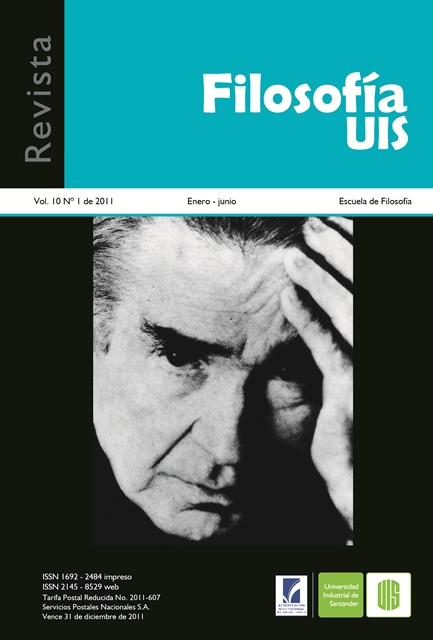Published 2011-07-15
Keywords
- logic,
- ethics,
- psychology,
- phenomenology,
- values
- epoché,
- eudaimonía ...More
How to Cite
Copyright (c) 2011 Susi Ferrarello

This work is licensed under a Creative Commons Attribution 4.0 International License.
Abstract
Thinking, acting and being are pivotal poles of our daily life, involving epistemological and practical faculties. To understand the balance between what we know and we do, we should figure out to what extent our being affects epistemological and practical choices. The questions I raise in this paper concern the boundaries of logic, ethics and psychology and the influence mutually exerted. My aim here is to display the part taken by logic and ethics in every identity and to figure out how fluid their presence is (if any). I wonder, particularly if there is a kind of paradox in moral philosophy. Indeed, we learn from the Delphic and Socratic saying the wise imperative –“γνῶθι σεαυτόν” (“know thyself”)– but it is quite apparent that we cannot get all that we know about ourselves out. Hence in this paper I am going to sift the meaning of this imperative in order to figure out if we have to take it as a sort of epistemological imperative or as an ethical one.
Downloads
References
- Bernet, Rudolf; Kern, Iso & Marbach, Eduard (1993). Introduction to Husserlian Phenomenology, Evanston: Northwestern University Press.
- Baumann, Zygmut (2004). Identity, Cambridge: Cambridge University Press.
- Donoe, Janet (2004). Husserl on Ethics and Intersubjectivity. From Static to Genetic Phenomenology, Amherst: Humanity Books.
- Descartes, René (1993). Meditations on First Philosophy, ed. by Charles Taylor, London: Routledge.
- Flanagan, Owen & Rorty, Amélie (1997). Identity, Character and Morality, Cambridge: MIT.
- Husserl, Edmund (1987). Aufsätze und Vorträge (1911-1921), ed. by Thomas Nenon und Hans Rainer Sepp, The Hague: Kluwer Academic Publishers.
- Husserl, Edmund (2004). Einleitung in die Ethik 1920 – 1924, ed. by Hennig Peucker, Dordrecht/Boston/London: Kluwer Academic Publishers.
- Husserl, Edmund (2002). Einleitung in die Philosophie. Vorlesungen 1922/23, hrsg. von Berndt Goossens. Dordrecht, Netherlands: Kluwer Academic Publishers.
- Husserl, Edmund (1988). Vorlesungen über Ethik und Wertlehre, 1908 - 1914, ed. by Ulrich Melle, The Hague, Netherlands: Kluwer Academic Publishers.
- Macintyre, Alasdair (1984). After Virtue, Oxford: Oxford University Press.
- Melle, Ulrich (1991). “The Development of Husserl’s Ethics”, In: Etudes Phénoménologiques, 13-14, pp. 115-135.
- Melle, Ulrich (1988). “Einleitung des Herausgebers”, In: Hua. 28, The Hague, Netherlands: Kluwer Academic Publishers.
- Parfit, Derek (1984). Reasons and Persons, Oxford: Oxford University Press.
- Peucker, Hennig (2008). “From Logic to Person: an Introduction to Edmund Husserl”, In: Review of Metaphysics, XII, pp. 307-325.
- Rorty, Amélie (1969). The Identities of Persons, Berkley and Los Angeles: University of California Press.
- Sandel, Michael (1982). Liberalism and the Limits of Justice, London: Cambridge University Press.
- Taylor, Charles (1976). “Responsibility for Self”, In: Oksenberg Rorty, A. (ed.), The Identities of Persons, Berkley and Los Angeles: University of California Press, 1969, pp. 281-299.
- Taylor, Charles (1985). Human agency and language: Philosophical papers volumen 1, Cambridge: Cambridge University Press.
- Similansky, Saul (2007). 10 Moral Paradoxes, Oxford: Blackwell Publishing.
